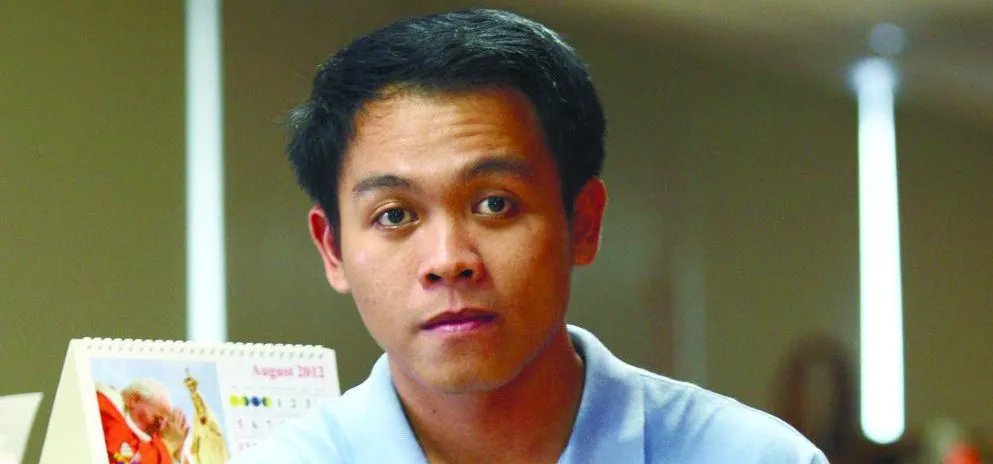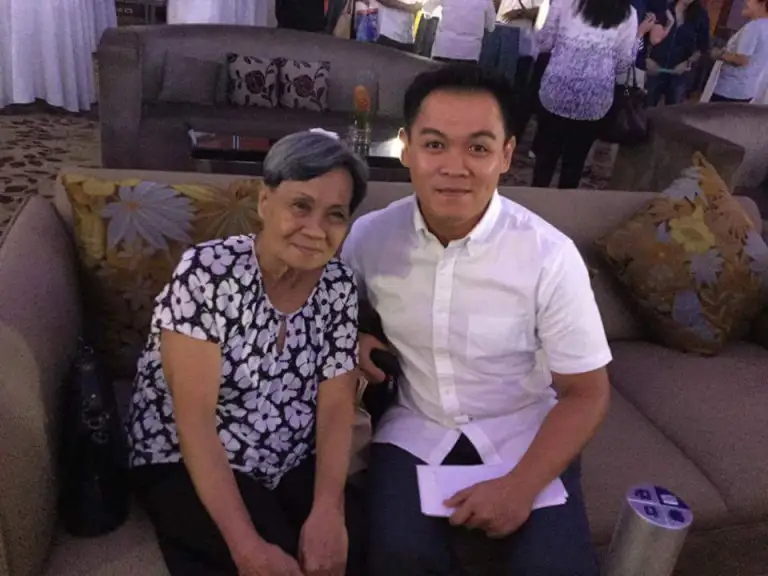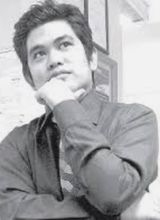The Ador Side: weak internship, rejection didn’t stop his national success
More persons of interest

The Ador Side: weak internship, rejection didn’t stop his national success
KEVIN A. LAGUNDA
May 28, 2018
FATE shunned Ador Vincent Mayol’s plan to become a priest. Instead, she carved a path for the Mandaue City native toward journalism, which has been his convent for nearly a decade.
As a journalist, the low-key University of San Jose-Recoletos alumnus is not obliged to deliver sermons from the pulpit to effect change in society, or prick a reader’s heart.
Mayol spreads journalistic gospels through his reports about real events and genuine people. The 31-year-old journalist started writing stories and delivering scoops for Cebu Daily News on Sept. 14, 2008, covering several beats—local government units, courts, police offices and the Church.
In the past nine years, his dedication and hard work paid off after several award-giving bodies recognized his works.
Mayol took home national awards for Best News Coverage, as well as Best Special Feature, in 2016 and 2017 in the Catholic Mass Media Awards organized by the Archdiocese of Manila.
In Cebu, he was also recognized by the International Justice Mission (IJM), which presented the Justice Award for Reporting Human Trafficking; and the Archdiocese of Cebu, which presents the Cebu Archdiocesan Mass Media Awards (Camma).
He bagged the Justice Award in the News Writing category in 2011 and 2013, and the Feature category in 2013; and the Camma in both the News Writing and Feature categories in 2015 and 2017.
In the Globe Media Excellence Awards (GMEA), he was named Reporter of the Year for Print in 2013, 2014, 2015 and 2016, as well as Reporter of the Year for Online Portal in 2016. Originally a Cebu contest, the GMEA became a Visayas-wide contest beginning in 2015.
In this interview, Mayol talks about his craft and career, what his awards mean to him, and how newsroom and beat beauties keep his fountain of inspiration flowing.

Ador Mayol, with his mother, Adoracion, during the Globe Media Excellence Awards 2016 in Cebu City
Apparition of journalism
When you were young, did you foresee a future in journalism?
Not in my wildest imagination did I ever think I would become a journalist. It wasn’t what I dreamed of. But some things in life just happen suddenly, unexpectedly.
What made you enroll in a mass communication course?
I was supposed to pursue studies at the seminary to fulfill a childhood dream. That was May of 2003. I was excited to inquire about the requirements only to be told that enrollment at the San Carlos Seminary College had come three months earlier. Left without a choice, I had to think of another degree program with less Math subjects. I’m horrible at numbers even as I pretend to like them.
My second option was Mass Communication since it was a step toward realizing another dream: of joining the fluvial procession of the Sto. Niño. When I was a child, I used to cry in front of the radio while listening to the media coverage of the sea procession. I would have loved to go to the basilica, but it was hard for my mother, who has hypertension, to wade through the thick crowd. I thought becoming a journalist would allow me to join the boat ride and participate in the activities in honor of the Sto. Niño. So I decided to finish Mass Communication and forgo plans of becoming a priest, convinced that journalism could also be a good medium to evangelize.
Did your teachers mold you to become the journalist of your caliber right now?
I’m forever grateful to all my professors. They taught me not just about the subjects, but life lessons which have lasting impact on me. They taught me not to give up easily, to shun mediocrity and do all that is in our power to make things work. Ignorant in some ways, I need to be guided and mentored toward what is best for me.
Did your internship help you prepare for the transition from student to professional journalist?
Yes, it did. Internship gave me a glimpse of what media work actually is, although my stint as a trainee was not likable. I was too shy to assert myself and did not have the guts in pursuing stories without being told. My internship was atrocious, so to speak. And it did reflect in my grade. I was given a passing rate of 3 by the print editor. That was kind enough, considering my awful performance.
The following semester, instead of trying out internship in broadcasting, I decided to return to the newspaper company that was so kind enough to let me pass. I was hoping to get a better grade the second time around. But there wasn’t much difference. Still, I got a 3.
Journey in journalism
Did you consider not working in the media industry?
I always wanted that my first job be in line with my communications course. Believe it or not, I first tried my luck at the company that almost flunked me. I don’t know why. Perhaps there was just that sense of familiarity. I submitted my resume and application papers to the lobby guard and was told to wait for a call from the human resource (HR) officer.
I was hopeful, and yet after four months, I didn’t receive any communication from the company. Thinking that the HR officer may have misplaced my files and was just ashamed to let me know about her “clumsiness,” I submitted another set of application documents.
This time, the HR officer talked to me. No, she had not misplaced the first set of application papers I sent. She said she didn’t bother to call me because the company wasn’t hiring reporters at the time. I partly believed. But at the back of mind, I thought they didn’t want to hire me because of my lackluster performance when I was an intern. I could not blame them.
So I moved on and took my chance at two other media outfits and a call center company. Over a year since I graduated, I still hadn’t landed any job. I remember walking along the streets of Cebu City like a stray dog, bringing envelopes containing my resume and application, and hoping there would be companies that could give me a crack at work. I told myself I didn’t care about not getting any pay as long as I would belong to a company.
While thinking about my next move, something in me was saying to give the first company I applied with a third try. But this time, I did not go through the HR, which had rejected me twice. Mustering all my courage and desperate to have a place I could call my second family, I decided to directly call the editor-in-chief who had given me a grade of 3 twice during my horrible internship. It was a wild try, a daunting move.
“Hello, Miss. Good afternoon. Si Ador diay ni, katong intern diha sa una (This is Ador, your former intern),” I told her. “Mahimo ko motabang og suwat-suwat diha sa CDN? Tabang lang ko, Miss, kay morag puno man mo (May I help out with some writing tasks there at CDN? I’d just be helping out because you are probably fully staffed already),” I added, using the words she might have used as a reason to reject me. It paid off. She said she would give me a try. It was the sweetest remark I had heard for so long a time.
I can still remember the date: Sept. 12, 2008, a Friday. And three days later, Sept. 14—the feast of Our Lady of Sorrows—I started going to the field, writing for Cebu Daily News. I entrusted my profession to the Blessed Mother who, in times of sorrow and joy, is with me. During my first week in the office, I could see the HR officer staring at me from outside the glass door, bewildered at how I was able to work without having been hired by her. That was how my journey in journalism started.
What made you stick with journalism? Why did you not look for a better-paying job?
I had difficulty finding a job, so I stayed with Cebu Daily News through ups and downs. Believe it or not, I didn’t care much about salaries for years. But as I grow old, with plans to have a family, I realize that pay also matters.
What was your first writing assignment for Cebu Daily News?
I was assigned to cover Lapu-Lapu City events for a month before I was transferred to the court and Church beats. I cannot remember the first story I wrote. What I remember is that on my first day, I got a tongue-lashing from my editor for going to the Cebu City Hall, Capitol and the Archbishop’s Palace to write stories that had not been assigned to me instead of covering stories in Lapu-Lapu as agreed upon. Not having had work for over a year, I was just too aggressive. I also remember my first banner story, which was about the arrest of Joavan Fernandez by the National Bureau of Investigation.
What were the lessons you got from veteran journalists? What is your golden rule you often impart to your interns?
Five important lessons I learned and impart to others: Work hard and never settle for less. Tame yourself because attitude matters. Obey your editors even as you grumble, and whatever they ask you to do, do it well. Be humble and think of others as better than you because in life, there will always be someone greater and there is always something we must learn. Lastly, pray unceasingly because all four other things I mentioned are to no avail without God through whom we live and have our being.
Motivation to write
What is your motivation to wake up every day and write stories?
Motivation changes over time. The thought of meeting friends and co-journalists, chasing stories, and getting the work done get me out of bed. At its best, journalism gives us a crack at making a difference. It can be a lot of fun and very rewarding.
Do you have any ritual before writing a story?
Coffee helps us stay awake. Water keeps us hydrated. A little bit of inspiration from crushes keep creative thoughts flowing. But nothing is more effective than prayer. The Holy Spirit equips us with everything we need to write stories that adhere to the truth and transmit the Word through whom He bestows all that is good.
What is your writing process? Do you write the details first before fleshing out the story?
I’ve always associated writing news stories and features with building a house. You start with the foundation and then the beams, the walls, the roof, the floor, and so on and so forth until you put the furniture, paintings and other accessories. But before all these, you need to have a master plan, in the case of journalism, an outline.
How do you come up with your story ideas?
I love pursuing stories that affect the community, especially the marginalized sector and those without a voice in society. We must remember that journalism is not just about writing articles, beating deadlines, and pleasing the editors. It is also about effecting change through the stories we write.
Why is it important for a journalist to think, explore story ideas and not just act like a robot awaiting orders from the editor?
We’re always encouraged to be thinking journalists—someone who is not satisfied to be just a recorder of modern history. We are not stenographers, and our most important tool is not the pen, notebook, cellphone, recorder or computer. A journalist’s most vital equipment is the brain and heart. We use the brain to think, and the heart to make readers feel the story. Good writing involves critical thinking and the power of emotions.
What is your guiding principle as a journalist?
I’m only as good as my last story. So I have to give my all in every article I write although it doesn’t happen all the time.
Triumphs in journalism
What do you think of awards?
Winning awards doesn’t make one better than the others in the same manner that not having any accolade makes a person of lesser value. Awards don’t define a person’s worth. Accolades would soon be forgotten. As St. Teresa of Calcutta plainly said: “At the end of life, we will not be judged by how many diplomas (or awards) we have received, how much money we have made, how many great things we have done. We will be judged by ‘I was hungry, and you gave me something to eat. I was naked and you clothed me. I was homeless, and you took me in.’”
Does an award motivate you to write? Or do you write to get an award?
Yes, it motivates. But awards aren’t what journalism is truly all about. Journalism is about working hard for every story one makes every single day, not only for oneself, but for everyone who thirsts for the truth. Awards simply come.
Do you think a journalist needs an award to validate his status as a journalist?
They are not a prerequisite to being a better journalist. Like life, journalism is not so much about being successful and reaping awards. It is rather about doing it with the right intentions and purpose, and being faithful to the truth.
They say journalists write the rough drafts of history. Do you encourage the young ones who love to write to try journalism?
The media is in a state of flux at present. But do not let it stop you from fulfilling your dream. If you have the passion and the patience, go for it. 

Kevin Lagunda
Kevin A. Lagunda, a regular contributor to CJJ Magazine, is also news reporter and sub-editor at SunStar Cebu.
